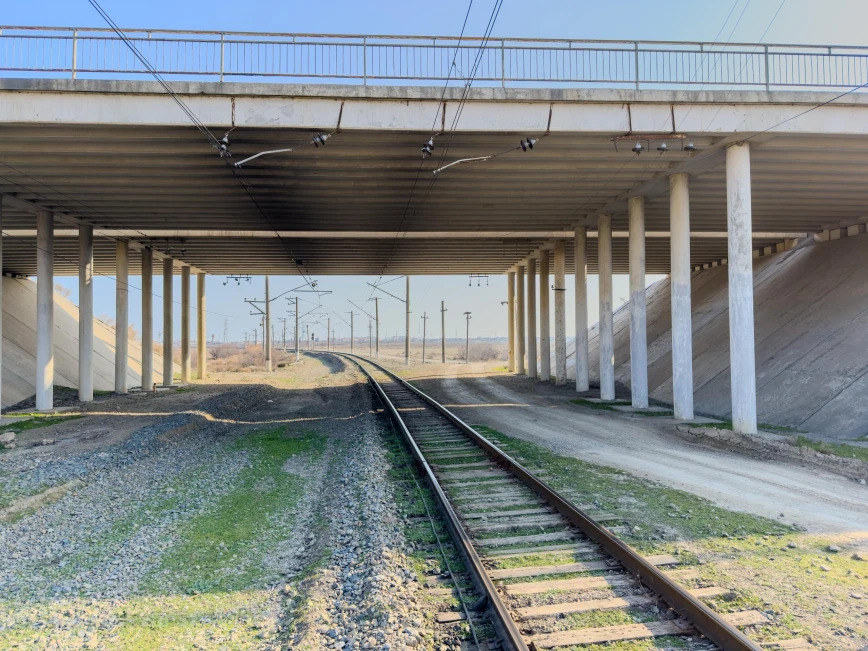BAKU, Azerbaijan, July 19. Azerbaijan continues advancing its cooperation with several countries in the development of international transport corridors and freight operations. One notable initiative is the recently signed Memorandum of Understanding between “Azerbaijan Railways” CJSC and the China State Railway Group Corporation, which focuses on enhancing the Baku–Tbilisi–Kars (BTK) railway line.
The sides agreed to develop transport connectivity along the BTK route, which provides access to Türkiye and subsequently to Europe. This move is expected to significantly accelerate the delivery of goods from Chinese production hubs to European markets via Azerbaijan, Georgia, and Türkiye.
The agreement also covers the joint development of railway and port infrastructure, expansion of container transport across the Caspian Sea, and increasing the number of daily block trains to reach ten. Experts view this as a key step toward boosting Azerbaijan’s transit potential and enhancing the competitiveness of the Middle Corridor.
Economist Parviz Heydarov told Trend that the BTK railway line is a crucial part of Eurasia’s transport infrastructure. “Back in 2017, when the line was launched, it enabled fast and reliable cargo transit between Asia and Europe via the Middle Corridor,” he said, emphasizing the BTK’s critical role in transporting cargo from China and Central Asia to Europe.
 Heydarov recalled
that after initial doubts about the line's efficiency, a revised
project plan was developed in late 2022.
Heydarov recalled
that after initial doubts about the line's efficiency, a revised
project plan was developed in late 2022.
"Initially, there was considerable skepticism about the effectiveness of this transport route when it was first designed, constructed, and launched. However, over time, growing demand led to a reassessment of the project, and by the end of 2022, it was re-evaluated and a new development plan was prepared to expand the BTK railway. This refers to the period following the line’s commissioning," he said.
As a result, reconstruction and expansion works carried out on the 184-kilometer Georgian section of the line increased its annual cargo capacity from one million to five million tons.
“Today, the BTK is considered internationally competitive and ready to handle a large share of cargo flows between Asia and the West,” he added.
The Memorandum of Understanding (MoU) signed between Azerbaijan Railways Closed Joint-Stock Company (CJSC) and China State Railway Group Co., Ltd. is set to inject new momentum into Baku-Beijing relations while further enhancing the operational capacity of the BTK railway line. This agreement will accelerate and expand the transit of all types of Chinese-manufactured goods to European markets through Azerbaijan, Georgia, and Türkiye.
The growth in Azerbaijan-China relations is evident not only in transportation but also in mutual investment and trade turnover. In the first quarter of 2025, foreign direct investment (FDI) inflows from China into the Azerbaijani economy reached approximately $7.4 million.
Compared to the same period in 2024, Chinese investments in Azerbaijan increased by about $4.2 million, more than doubling. In 2025, investments from China accounted for roughly 0.5 percent of Azerbaijan’s total FDI inflows.
Conversely, Azerbaijan’s investments in the Chinese economy reached approximately $5.3 million in the first quarter of 2025, marking an increase of over $5.1 million, or more than 60 times, compared to the same period in 2024.
Azerbaijani investments in China represented about 1.7 percent of the country’s total FDI outflows during this period.
China holds a significant position in Azerbaijan’s trade turnover. In the first half of 2025, trade between Azerbaijan and China reached $2.1 billion, marking an increase of around $451.4 million or 27.6 percent compared to the same period in 2024.
During this time, trade with China accounted for 8.56 percent of Azerbaijan’s total trade turnover, placing China fourth among Azerbaijan’s top trading partners.
From January through June 2025, Azerbaijani exports to China totaled about $46.3 million, representing 4.3 times increase, $35.6 million, compared to the same period last year.
Conversely, imports from China to Azerbaijan amounted to nearly $2 billion during the reporting period, growing by $415.7 million or 1.3 times compared to the first half of 2024. This made China Azerbaijan’s leading source of imported goods.
Overall, these figures underscore that economic relations between Azerbaijan and China have reached a historic high. The development of the transport sector remains a key focus within this expanding cooperation.
Commenting to Trend, economist and head of the Public Union for Economic and Social Research Support, Eyyub Karimli, said that the BTK railway deal offers several strategic and economic advantages.
“It’s a significant step in boosting freight capacity along the Trans-Caspian International Transport Route within the Middle Corridor.
Undoubtedly, the newly signed agreement will have a far-reaching impact on both regional and global transportation systems. By expanding the capacity of the Baku–Tbilisi–Kars (BTK) railway, the agreement creates favorable conditions for significantly increasing cargo flow between China and Europe in both directions. It also enhances the competitiveness of the Trans-Caspian International Transport Route — known as the Middle Corridor — against other alternative trade routes. Currently, BTK’s annual freight capacity stands at around 1 million tons, but the new plans envision raising this figure to 5 million tons. The agreement between Azerbaijan Railways and China Railway is expected to boost the overall efficiency of cargo movement along the corridor, reduce logistical bottlenecks, and accelerate transit times," he said.

The economist believes the recent agreement with China to expand the potential of the Baku–Tbilisi–Kars (BTK) railway could yield substantial benefits for Azerbaijan’s economy.
“The agreement is expected to boost transit revenues and state duties. It may also generate new employment opportunities in the logistics and railway sectors and foster the expansion of business activity in these areas. In the long term, this will have a positive effect on Azerbaijan’s foreign trade turnover and further consolidate the country’s role as a key regional transport hub,” he said.
Karimli also emphasized the strategic significance of the agreement for China.
“The deal presents clear strategic advantages for China as well. Within the framework of the 'One Belt, One Road' initiative, it provides a reliable, secure, and expedited route to Europe. In contrast, the security of cargo transported through Russian territory remains uncertain, while sanctions further diminish its appeal. Expanding the BTK’s potential would also enhance access to Turkish and European markets:
If Türkiye’s railway network is successfully integrated, the time, speed, and cost of cargo movement from China to Europe will improve significantly,” he added.
Karimli concluded by underlining the broader scope of the project.
“I believe that this initiative is not limited to technical upgrades. It represents a long-term strategy for the development of international transport corridors. If implemented successfully, it could establish the Middle Corridor as the main artery of Eurasian logistics and deliver lasting economic and geopolitical dividends for the region,” he said.
Overall, the two sides aim to carry out joint projects that will enable faster, safer, and more efficient cargo transportation between China and Europe. This includes enhancing coordination between terminals and ports, as well as improving information exchange in customs and transport systems.
Cooperation in this direction is expected to deepen regional economic integration and further solidify Azerbaijan’s position as a strategic logistics hub. The country’s geostrategic location aligns closely with China’s "One Belt, One Road" initiative, creating even stronger shared interests in developing transcontinental connectivity.
Stay up-to-date with more news on Trend News Agency's WhatsApp channel







